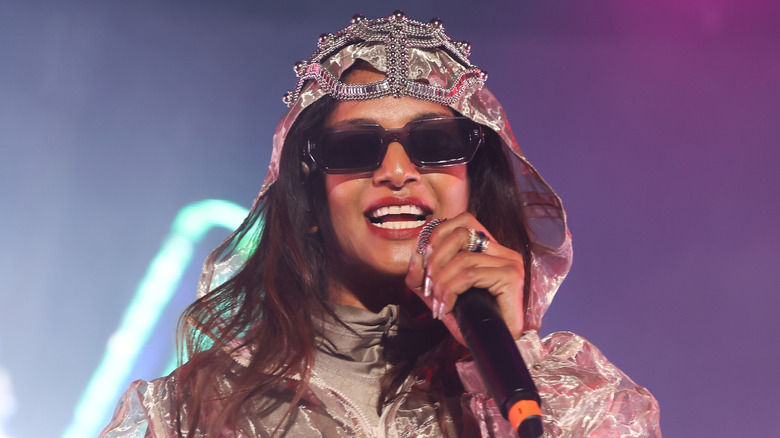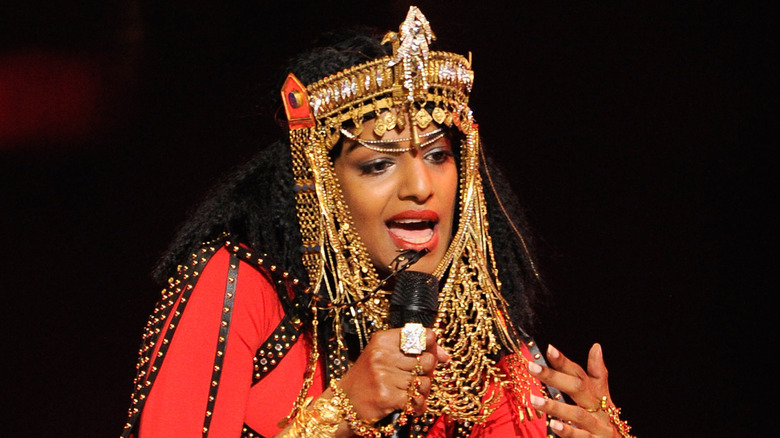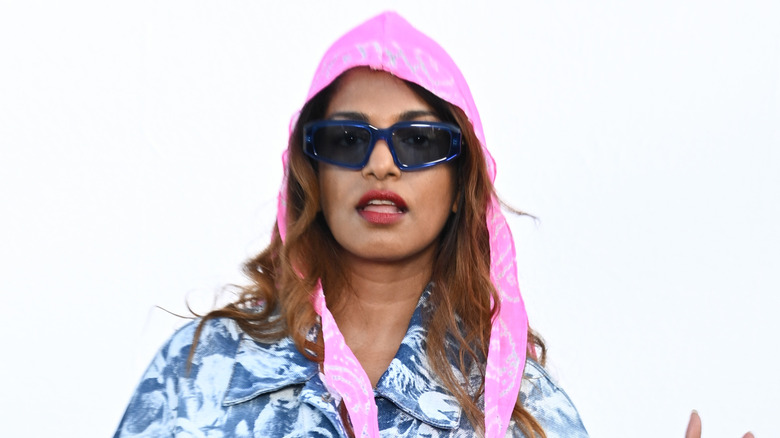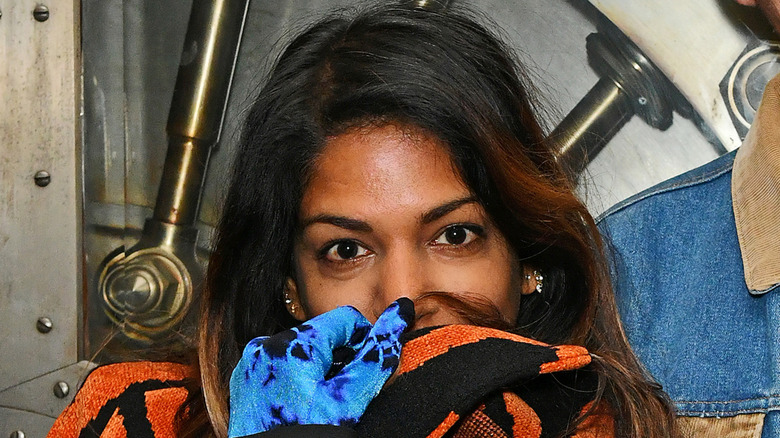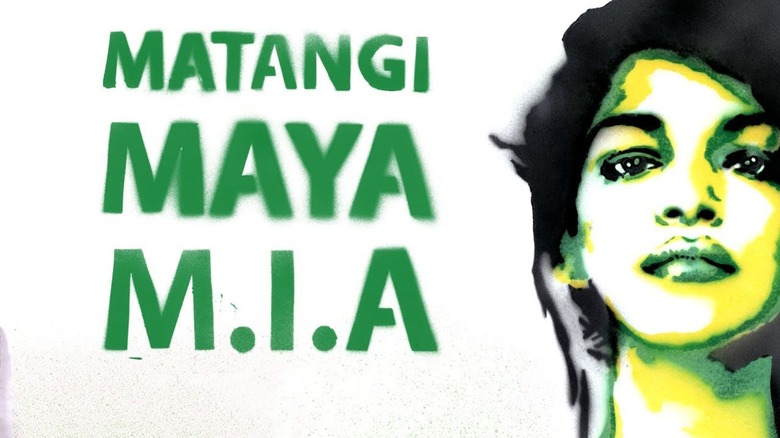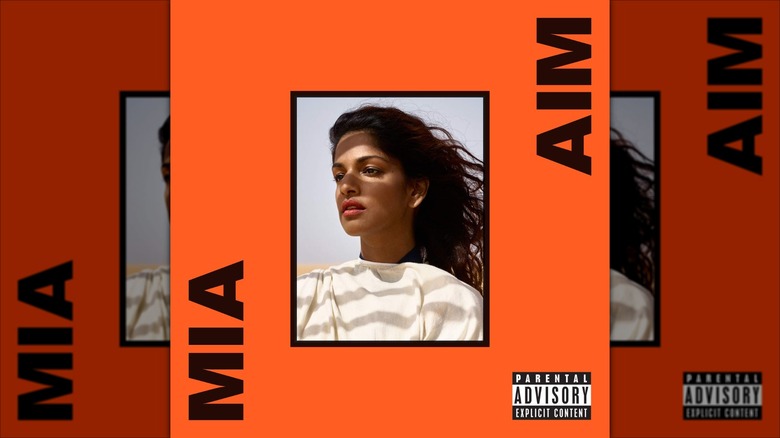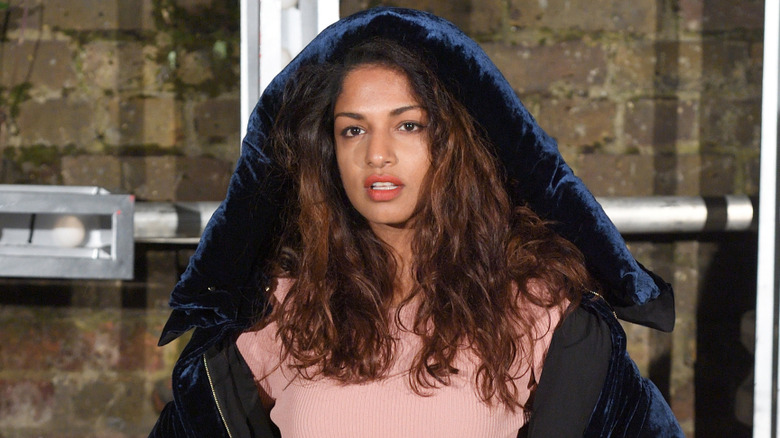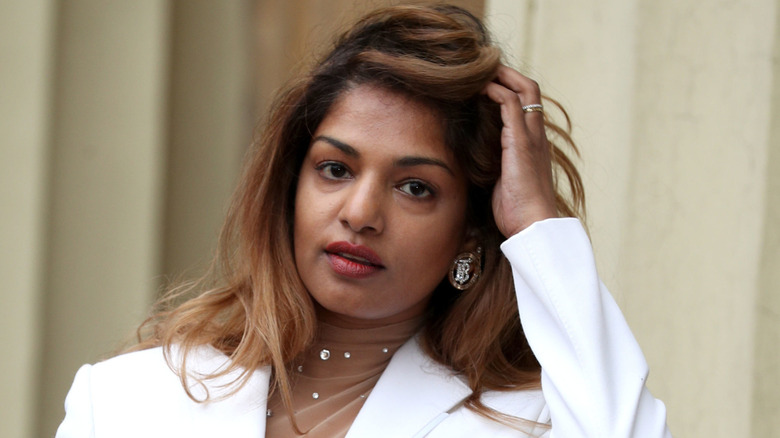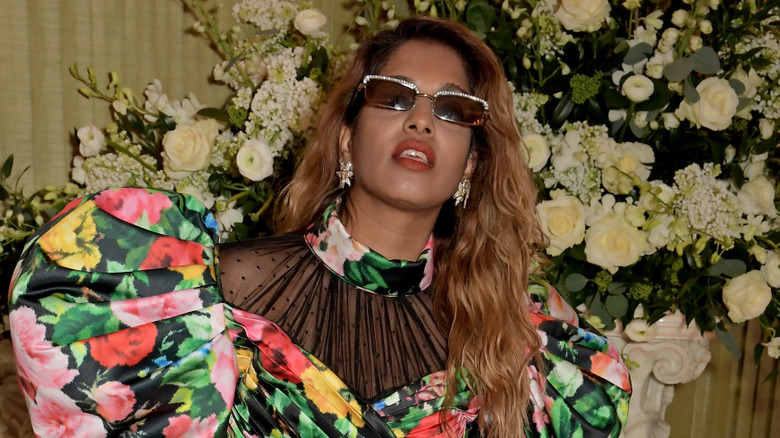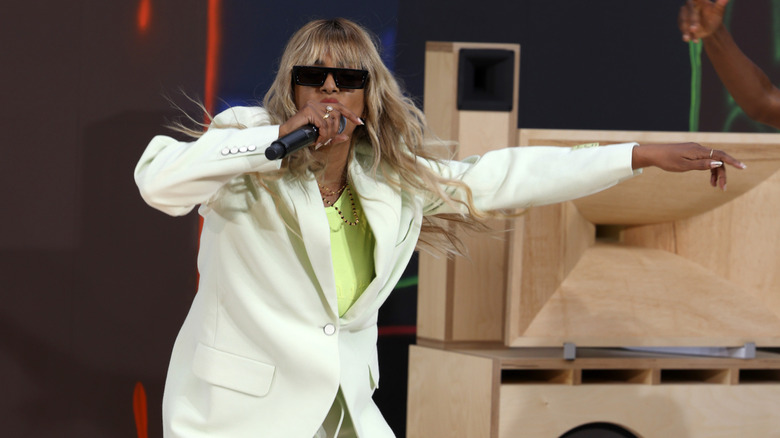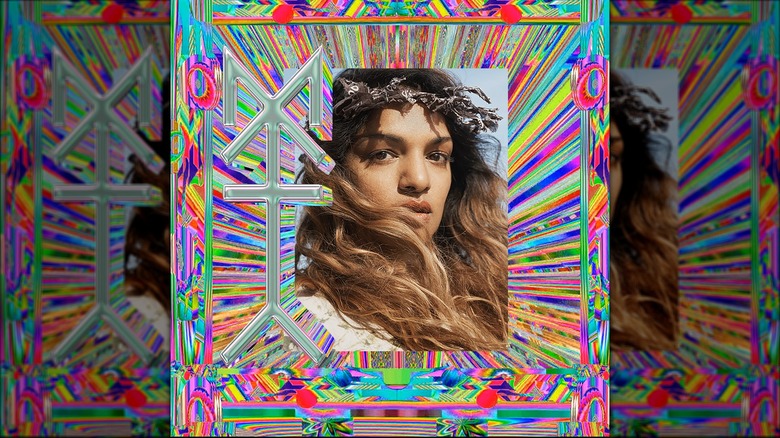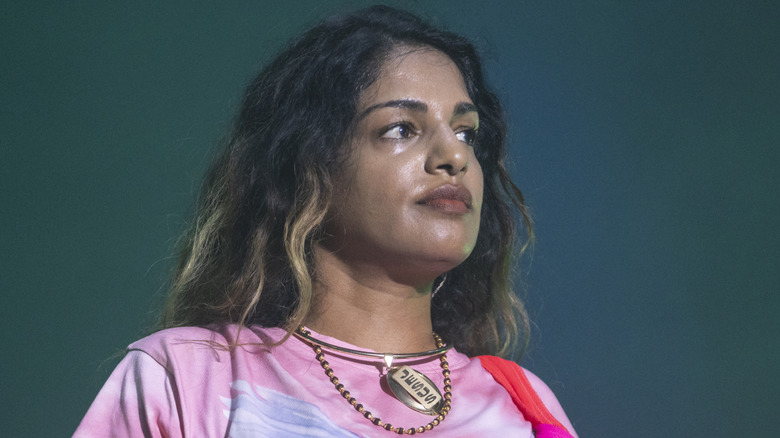Why You Don't Hear Much From M.I.A. Anymore
Mathangi "Maya" Arulpragasam, better known as M.I.A., changed the game when she came on the scene in the early aughts. The British rapper's penchant for combining multiple genres of music into her songs set her apart from her peers, and she truly made a name for herself. For a time, you couldn't go long without hearing her music or seeing her involved in a news story or two, but those days are behind her.
M.I.A. was once the talk of the town, but you hardly hear mention of her anymore. She nabbed the coveted Super Bowl Halftime Show not too long after making it big, but M.I.A. has been mostly out of the spotlight for years, leaving some of her fans wondering whatever happened to her. M.I.A. is still around, and she didn't exactly go anywhere, but that's not to say she hasn't faded into the background compared to when she was at the height of her fame.
Part of the reason M.I.A. isn't as easy to find these days stems from the many controversial things she's said and done. The former refugee-turned celebrity was never shy about expressing her personal views, and this hasn't exactly worked for her outside of a niche audience. Other reasons stem from lackluster album and track sales, and less frequent production has pushed M.I.A. into the shadows of the music industry. Here's some reasons why you do not hear as much from M.I.A. anymore.
M.I.A. had a controversial Super Bowl appearance
One of the career pinnacles any musical artist can hope to achieve is to be asked to perform at the Super Bowl Halftime Show. These are often huge affairs, and while the artists aren't directly compensated for their performances, they often pour everything they have into their acts. The exposure to hundreds of millions of people is payment enough, and the Super Bowl is often packed with many viral moments worth remembering. The Halftime Show is an excellent opportunity for any artist, and M.I.A. landed a two-minute spot during Madonna's show for the 2012 game. It's not unusual for the Halftime Show to offer some memorable moments, but in M.I.A.'s case, her show is remembered for all the wrong reasons, and it didn't help her career.
While performing during the Super Bowl XLVI Halftime Show, M.I.A. looked at the camera, extended her middle finger, and said "s***" during the live broadcast. This didn't go over well with the Federal Communications Commission or the NFL, which sought damages in the amount of $16.6 million from the rapper. M.I.A. settled with the NFL for an undisclosed sum, but beyond the financial impact, her Super Bowl antics only worsened her standing as a performer and marred her career.
M.I.A. has been accused of being a 'terrorist sympathizer'
M.I.A. has always been controversial, and she's been labeled a terrorist sympathizer. This stems from her Sri Lankan ancestry and the fact that she's used the imagery of the Tamil Tigers in her work. The Tamil Tigers were a militant terrorist organization that fought the Sri Lankan government for decades in an attempt to establish an independent Tamil state. The group's methods placed it clearly on the side of violence, and M.I.A.'s use of their imagery and iconography didn't go unnoticed.
M.I.A. and her family emigrated from Sri Lanka, and her father was associated with the Tamil Tigers. He also founded Eros, a student organization that advocated for the creation of a separate Tamil state in the 1970s and '80s. These connections inexorably link M.I.A. to aspects of Sri Lankan history that are violent, and using such imagery and words in her songs has been controversial, to say the least. This has led some to accuse M.I.A. of being a terrorist sympathizer, and she's addressed this over the years because it's an issue that continues to be raised.
M.I.A. pointed to other groups that discussed the Tamil Tigers, suggesting that if she were a terrorist supporter, so too are governments and aid organizations. In a 2008 statement, she said (via The Guardian), "I don't support terrorism and never have. As a Sri Lankan that fled war and bombings, my music is the voice of the civilian refugee." Still, to many, she showed sympathy for a group perceived as terrorists who were wiped out by the government, and it didn't do her album sales any favors.
Censorship has left M.I.A. feeling less 'motivated'
If you go buy an M.I.A. album or listen to her songs, you'll likely find a parental advisory warning for explicit content. Not that there's anything wrong with that or M.I.A.'s music, but it's important to note that her work isn't what some call family-friendly. On top of the content of her work crossing lines of what some consider decent, M.I.A.'s politics and seeming support of a terrorist organization in Sri Lanka led to greater censorship than she likely anticipated.
Some of her social media accounts were frozen over the years, making it more difficult for M.I.A. to connect with her audience. Additionally, her mother had difficulty in getting a visa to enter the United States, which didn't sit well with the rapper. She had issues for years in getting her music produced, largely because she doesn't fit within a single genre.
In 2018, M.I.A. addressed these issues in an interview with The House of Strombo (via Consequence), saying, "I have been pushed out [of music] for five years or something, and I haven't been able to successfully release a record at all within this system. Or get my voice heard in terms of the Tamil plight, or get credit for anything I did. That's been completely erased. And people know, but no one is allowed to say it." Because of this, M.I.A.'s releases trickled and all but stopped for some time due to a lack of motivation because of censorship.
M.I.A. was initially unhappy with her documentary
Before making it big in the music industry, M.I.A. studied film while attending the University of the Arts London's Central St. Martins. She didn't go long without a camera in her hand, documenting her life, so when her friend, Steve Loveridge, approached M.I.A. about filming a documentary about her, she handed him hundreds of hours of tapes. Loveridge took her films and shot others to create the 2018 documentary, "Matangi/Maya/M.I.A.," which premiered at the 2018 Sundance Film Festival. The documentary was a huge hit, winning the World Cinema Documentary Special Jury Award for at the festival.
While plenty of people at the festival enjoyed the film, M.I.A. wasn't initially convinced. Reports surfaced that she didn't like the documentary, but she's since discussed the film and her take on how it depicts her life. Her reaction was due to "the shock of having so much personal stuff in there about me was very difficult," she explained to the BBC, adding, "I'm going to have to treat it as free therapy."
She also said that she needed time to digest the material, and she'd have some discussions with Loveridge. As it happens, the documentary was well received, and it likely helped inject a boost of recognition to M.I.A.'s waning musical career, but to her eyes, it wasn't easy to take in. She has gone on record, telling Billboard, "It's not the film that I would have made," and considering her background in film study, she likely has plenty of notes.
M.I.A.'s 2016 album was a commercial disappointment
In 2016, M.I.A. released her fifth studio album, "AIM," which she claimed would be her last. M.I.A. said on BBC Radio 1 (via UPI), "It's my last record, so I wanted it to be happy. There's no complaints on it. It's another side to me completely. I don't know if people know [about] that." This came after years of M.I.A.'s struggle within the industry, and the rapper was nearing a breaking point in terms of whether or not she wanted to continue recording music professionally.
Unfortunately, "AIM" failed to reach the same levels of success as her previous four studio albums, making for a commercial and critical disappointment. Still, she put a lot of effort into it, recording alongside several other artists from around the world via collaborations that clearly show M.I.A.'s passion for her work. Like much of M.I.A.'s previous music, her sixth album focuses on the themes surrounding refugees, like the song, "Borders."
When it dropped, "AIM" made it to No. 66 on the Billboard 200 albums chart, making it the rapper's first not to break the top 40. Reviews of the album were mixed, with Will Hodgkinson of The Times writing that the record "starts well but quickly meanders into mediocrity," which is hardly a positive note. That said, he praised "Borders," but tore apart "Go Off" and "Bird Song," which he described as "unbearable; less the chirrup of a nightingale, more the scream of a seagull."
M.I.A. called out the Black Lives Matter movement
M.I.A. has never shied from controversy, but during an Instagram Live session, she crossed the line with a lot of people when she came out swinging against the Black Lives Matter movement. The controversial rapper said (via Hot New Hip-Hop), "We are made in the likeness of God, which is not our body, which is not our skin tone, which is why I don't support BLM." She went on to detail how she doesn't see skin tone as being the reason people suffer, saying it's beyond physical differences.
Beyond her comments about BLM, M.I.A. crossed another cultural taboo by slamming Beyoncé on social media in January 2025. This came after Beyoncé and Jay-Z purchased a $200 million home in Malibu, California, which didn't sit right with M.I.A. She wrote (via Vibe), "Money and everything and accumulation and everybody's spirit has been feeding into this machine. And the machine has been paying out; hence, you can have someone like Beyoncé have a $200 million house."
Needless to say, M.I.A. didn't adhere to the rules about being friends with Beyoncé. Back in 2016, she called out Beyoncé for supporting BLM but asked if she'd support Muslim lives in the same manner. Calling out the BLM movement didn't sit well with a large portion of M.I.A.'s would-be audience, and it further disenfranchised her from her listeners. As a result, she was dropped as the headline act from the 2016 Afropunk music festival.
Vogue allegedly pulled M.I.A.'s feature due to her stance on vaccinations
It wouldn't be disingenuous to label M.I.A. as a conspiracy theorist, and while she's embraced many outlandish theories about a lot of things, at her core, she's what the kids call anti-vax. When COVID-19 was beginning to rear its ugly head upon the world, M.I.A. took to X, formerly known as Twitter, and wrote: "If I have to choose the vaccine or chip, I'm gonna choose death – YALA," which received the response from an online user, "This tweet has disappointed me more than your last two albums."
Around this time, M.I.A. was working with British Vogue for a feature article, but it was pulled prior to publication. M.I.A. took to Instagram (via The Guardian), and in a since-deleted post, she uploaded screenshots of a conversation with someone working at the magazine. An unnamed editor wrote, "Considering our August is an issue where we're chronicling the struggles of the NHS to cope while a vaccine is tried to be made, we don't feel we can have her involved. It just wouldn't be right."
M.I.A. didn't take this well and defended herself, claiming she was just doing research, which doesn't make her anti-vax. Regardless, the article never made it to print, further alienating M.I.A. from the world.
Fans of M.I.A. can look forward to 'random surprise content'
As M.I.A.'s career waned and she struggled to release music via standard industry practices, she branched out into other areas. In 2020, M.I.A. that she would change how she releases her music, and she hopped onto Patreon. She opened a page where she releases premium content to her listeners for $5, $10, and $50 membership tiers.
At the time, M.I.A. said she joined Patreon because, as she explained to The Guardian, "I've tried all the other platforms, and it's like: this one is too mean and hateful, this one is too fake and self-obsessed, and this one just sells all your data to Cambridge Analytica. Hopefully, this one is going to be just right." Upon launching her page, M.I.A. revealed she'd open access to "random surprise content." "It might be a song, a recipe, a manifesto; maybe I could help you with your homework," she wrote.
Interestingly, the move to Patreon came after M.I.A. discussed her retirement during a 2018 interview with Rolling Stone, and she'd previously said that "AIM" would be her final album. While that didn't prove true, her releases trickled out slowly after 2016.
She's got her own unusual clothing line
Something that a lot of celebrities do in their careers is launch a clothing line, and M.I.A. is no exception. That said, her brand is a bit different from what you might find in a regular department store or high-end boutique. M.I.A. launched OHMNI, taking its name from her 2020 track, "OHMNI W202091." OHMNI is an unusual brand that embraces M.I.A.'s penchant for conspiracy theories because her products feature interwoven Faraday cages.
A Faraday cage is an electromagnetic shield composed of a conductive material, most often copper, which blocks electromagnetic signals like radio, Wi-Fi, and others. Essentially, if someone is worried about 5G signals penetrating their bodies, they can buy a top from OHMNI because it will block that from happening. The landing page for her store features icons showing that the clothing will block everything from satellite signals and Wi-Fi to unspecified forms of radiation and Bluetooth.
As her site explains: "OHMNI is your last frontier at preserving your privacy, autonomy, and rights over your body and your data. This is not your artist's foray into fashion. This is a necessity." M.I.A. debuted her clothing during an appearance on Alex Jones' "Infowars," which signals that she's catering to the fringes of American society who enjoy Jones' conspiracy theory-laden discussions and coverage.
M.I.A. released new music in 2020, 2022, and 2023
While M.I.A. has mused about retiring and indicated she'd stop releasing studio albums after "AIM" dropped in 2016, she hasn't exactly stuck to her guns. M.I.A. may not be releasing music at the level she did after making it big, but she's still producing songs and releasing them every so often. In 2020, she dropped the single "OHMNI W202091," breaking a three-year trend of not releasing anything. That track dropped first on Patreon, bringing it to her subscribers for free, and it's since been released to the world.
In 2022, M.I.A. surprised fans once more, but this time, she dropped an entirely new studio album, "Mata." This was the rapper's first album in six years, so it was a pretty big deal given how her career had waned in the years prior. The album features many of the genre mashups M.I.A. made famous years earlier, but it wasn't as well received as her previous albums. "Mata" failed to enter the charts in the U.S. and the United Kingdom.
After these relatively lackluster releases, M.I.A. kept at it, and in December 2023, she released the mixtape "Bells Collection." The 16-track mixtape features songs like "Free Pali" and "Bella Hadid." Skrillex, Troy Baker, and Blaqstarr all collaborated on the mixtape. Her most recent release came in January 2025 when M.I.A. dropped the single "Armour," which features many spiritual themes, as M.I.A. converted to Christianity in recent years, and her work shows this transition.
M.I.A.'s politics alienated many listeners
One of the issues that can often disenfranchise an artist from their listeners is politics. By speaking out against or lending support to one side of a charged political issue, artists like M.I.A. can widen the gap between themselves and their fans, and M.I.A. has never been shy about expressing her opinions. The rapper is keen on conspiracy theories, so during the 2024 presidential election, she threw her support to Robert F. Kennedy, Jr., who's reputation has been brutally rocked by scandals.
Kennedy has been outspoken against vaccines and other standard medical practices for years, which aligns with M.I.A.'s views on vaccines. When Kennedy dropped out of the race in favor of President Donald Trump, she followed suit, and threw her support Trump's way. While it's perfectly normal for someone to support their chosen candidate, supporting Trump comes with some caveats. It's not uncommon for artists to lose followers when they promote a controversial candidate, and Trump certainly fits the bill with all of the media moments he can't erase.
As a result, M.I.A. made herself unpalatable to a lot of people who would otherwise enjoy her music. Some fans took to her X page to express their disappointment, including one who wrote, "As an immigrant who was inspired by your artistic journey, I'm very disappointed ... It's so disrespectful to us immigrants that you support him. I still respect you as an artist, but I'm still disappointed."

